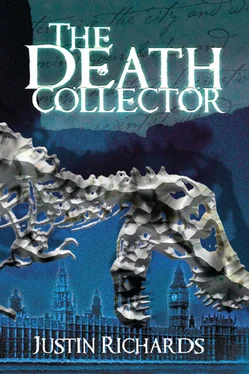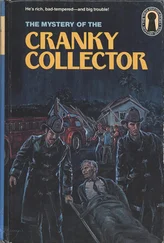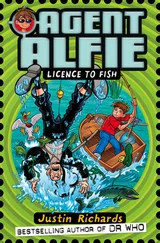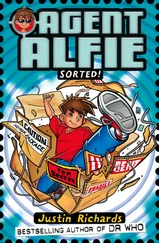Justin Richards - The Death Collector
Здесь есть возможность читать онлайн «Justin Richards - The Death Collector» весь текст электронной книги совершенно бесплатно (целиком полную версию без сокращений). В некоторых случаях можно слушать аудио, скачать через торрент в формате fb2 и присутствует краткое содержание. Жанр: sf_fantasy_city, на английском языке. Описание произведения, (предисловие) а так же отзывы посетителей доступны на портале библиотеки ЛибКат.
- Название:The Death Collector
- Автор:
- Жанр:
- Год:неизвестен
- ISBN:нет данных
- Рейтинг книги:4 / 5. Голосов: 1
-
Избранное:Добавить в избранное
- Отзывы:
-
Ваша оценка:
- 80
- 1
- 2
- 3
- 4
- 5
The Death Collector: краткое содержание, описание и аннотация
Предлагаем к чтению аннотацию, описание, краткое содержание или предисловие (зависит от того, что написал сам автор книги «The Death Collector»). Если вы не нашли необходимую информацию о книге — напишите в комментариях, мы постараемся отыскать её.
The Death Collector — читать онлайн бесплатно полную книгу (весь текст) целиком
Ниже представлен текст книги, разбитый по страницам. Система сохранения места последней прочитанной страницы, позволяет с удобством читать онлайн бесплатно книгу «The Death Collector», без необходимости каждый раз заново искать на чём Вы остановились. Поставьте закладку, и сможете в любой момент перейти на страницу, на которой закончили чтение.
Интервал:
Закладка:
Jessop blew out a long sigh. ‘Not unless you have any idea how we can make that ashtray …’ He paused to indicate a silver-plated ashtray on a low wooden table on the stage beside them. ‘Make that ashtray fly across the room and land in Mr Braithwaite’s lap.’
Liz looked at the ashtray. Then she looked across the stage to where Braithwaite was sitting.
‘No,’ she said. ‘Like the policeman in the play, I haven’t a clue.’
‘Pity,’ Jessop said. He turned and made his way less enthusiastically back to the auditorium. ‘Still, I expect we’ll think of something.’ He did not sound convinced.
The mortuary was little more than a hut with a wooden table standing unevenly in the middle of the damp floor. Doctor Jones washed his hands in a cracked tin basin in the corner of the room and then turned his attention to the final job of the day.
The body was already on the table. Jones was annoyed that the clothes had been removed. Someone had washed the corpse, which made Jones doubly-angry. How many times had he told them that the deceased was not to be touched save by himself. To have the clothes removed was to take away possibly vital evidence. To clean the body was to wash away more evidence. Even though this one had been in the ground for a week, he would still have liked to have met the man in his original condition. Preferably still in the coffin.
This was not morbid fascination on the part of Jones. Rather, it was typical of the methodical and meticulous way he approached his work. He did not pretend to enjoy his work for the police, and would have been happy to go home after finishing his general practice. But he suffered from a sense of duty, and he was very aware that if he did not help out when necessary then in all probability no one would.
The least he could expect, then, was that the body he was due to examine should not be tampered with. That this one had been was obvious from the moment he started his examination. He double-checked the notes he had been given, but there was no mention of a previous autopsy. Perhaps the notes were wrong — certainly surgery had been performed after death.
But, Jones thought, it would take a physician more dedicated and conscientious than himself to open up a cadaver and then sew it back together so carefully. And the places where incisions had been made — there was no sense to it at all. Jones stepped back from the table and surveyed the body of Albert Wilkes. The scars were obvious to anyone with any training. They seemed to run the length of the limbs. There was evidence of incisions in the chest and even under the receding hairline. When he rolled the body on to its side he could see at once that the pattern of scars was repeated on the back of the corpse. But why? For what purpose?
Frowning and no longer tired or aware of the lateness of the hour, Jones set to work. Within minutes he was more puzzled than ever. After an hour he again stepped back from the table. He wiped his brow with his forearm. On the table beside the body was a long bone he had removed from the left leg. The flesh and skin that had surrounded it hung in loose flaps on the table. Jones just stared at it.
It did not take long for him to come to his decision. He opened the door of the small mortuary and called for the police constable who was posted to keep him company and lock up when he left.
‘You all done, sir?’ the constable asked hopefully. His hope visibly faded as he caught sight of Jones’s expression. ‘What is it, Doctor Jones?’
Jones turned and strode over to the small desk in the corner of the room. He took a pen, dipped it in ink, and scribbled furiously on a sheet of paper. When he was done, he folded it and wrote a name on it. He handed the stained paper to the police constable.
‘I want you to take that to the station and have Sergeant Fisk or whoever is the most senior man on duty send it on to Sir William Protheroe at the British Museum.’
‘Sir William Protheroe?’
Jones dried his hands on a discoloured towel and nodded at the body on the table. The constable made a point of not looking at it. ‘I quote: “In the event of extraordinary results or findings that cannot be explained in the normal way of medical and anatomical understanding we are to inform Sir William Protheroe who will advise.”’ He tossed the towel into the corner of the room. ‘So cut along, constable, and have him informed. And you’d best tell your sergeant that this matter is not to be pursued, unless Sir William specifically asks.’
‘Right you are, sir.’ The constable turned to go. ‘Just out of interest, sir. Hope you don’t think I’m prying. But, what is the problem with the dead gentleman?’
Jones smiled thinly at the man’s deference. ‘Apart from the fact that he is dead, which can’t be a very satisfactory situation for him? Apart from that, the problem, as I have explained briefly to Protheroe in my note there, is that the bones in at least some of the dead gentleman’s limbs are not his own. Not even human, come to that.’ He sighed and looked back at the pale cadaver on the table. ‘And if that doesn’t run counter to our normal anatomical understanding of things, I don’t know what does.’
Chapter 9
The body was laid out on a workbench in the room that Sir William Protheroe used as a laboratory. It was a large room at the back of the British Museum. To all intents and purposes this room together with Protheroe’s rather smaller office, several large store rooms, and the persons of Protheroe himself and his assistant Garfield Berry constituted the entirety of The Department of Unclassified Artefacts.
Sir William had many skills, but he was not a professional pathologist. So rather than examine the body he turned his attention first to the notes provided by Doctor Jones. Each and every point the police pathologist made, Sir William himself checked with Berry’s help on the corpse lying before them. Anything that Protheroe and Berry did not understand or could not verify, Berry noted down on a sheet of paper.
Finally, Protheroe came to the bones. From his knowledge of palaeontology and archaeology he had some understanding of how bone behaved after death. He also had enough anatomical expertise to see at once that Jones had been right. The bone removed from Albert Wilkes’s left leg was not a human bone at all.
Under Protheroe’s direction, Berry weighed the bone, measured it, drew a scale diagram. ‘What do you think is up with this chap?’ Berry asked as he labelled his diagram.
Protheroe made a non-committal sound. He was examining the corpse’s right arm, feeling along the scar that ran down it. ‘Pass me that scalpel, will you?’
Berry put down his drawing and passed the surgical knife. He winced as he watched Protheroe open up the arm along the scar. Turned away as the elderly man folded back the dead greying skin and pushed his fingers inside. ‘How very curious,’ he murmured.
‘What, sir?’
‘I thought I was right with that bone from the leg. Now I’m sure.’ He held the slippery bone for Berry to take. It was surprisingly heavy.
There was something else odd about it too, Berry realised as he rinsed it in the laboratory sink. It had run the entire length of the arm, yet it was a single bone. He turned to Protheroe, and saw that the man was watching him, nodding with encouragement, drawing out the obvious question.
‘This can’t be right,’ Berry said. ‘There’s no joint. It’s all one piece. Where’s the elbow?’
‘A very good question,’ Protheroe conceded. ‘Another good question is how this bone could ever have connected to the wrist. Or the shoulder, come to that.’ He paused to consult a page of handwritten notes. ‘This Doctor Jones is both very thorough and very astute,’ he said quietly.
Читать дальшеИнтервал:
Закладка:
Похожие книги на «The Death Collector»
Представляем Вашему вниманию похожие книги на «The Death Collector» списком для выбора. Мы отобрали схожую по названию и смыслу литературу в надежде предоставить читателям больше вариантов отыскать новые, интересные, ещё непрочитанные произведения.
Обсуждение, отзывы о книге «The Death Collector» и просто собственные мнения читателей. Оставьте ваши комментарии, напишите, что Вы думаете о произведении, его смысле или главных героях. Укажите что конкретно понравилось, а что нет, и почему Вы так считаете.












